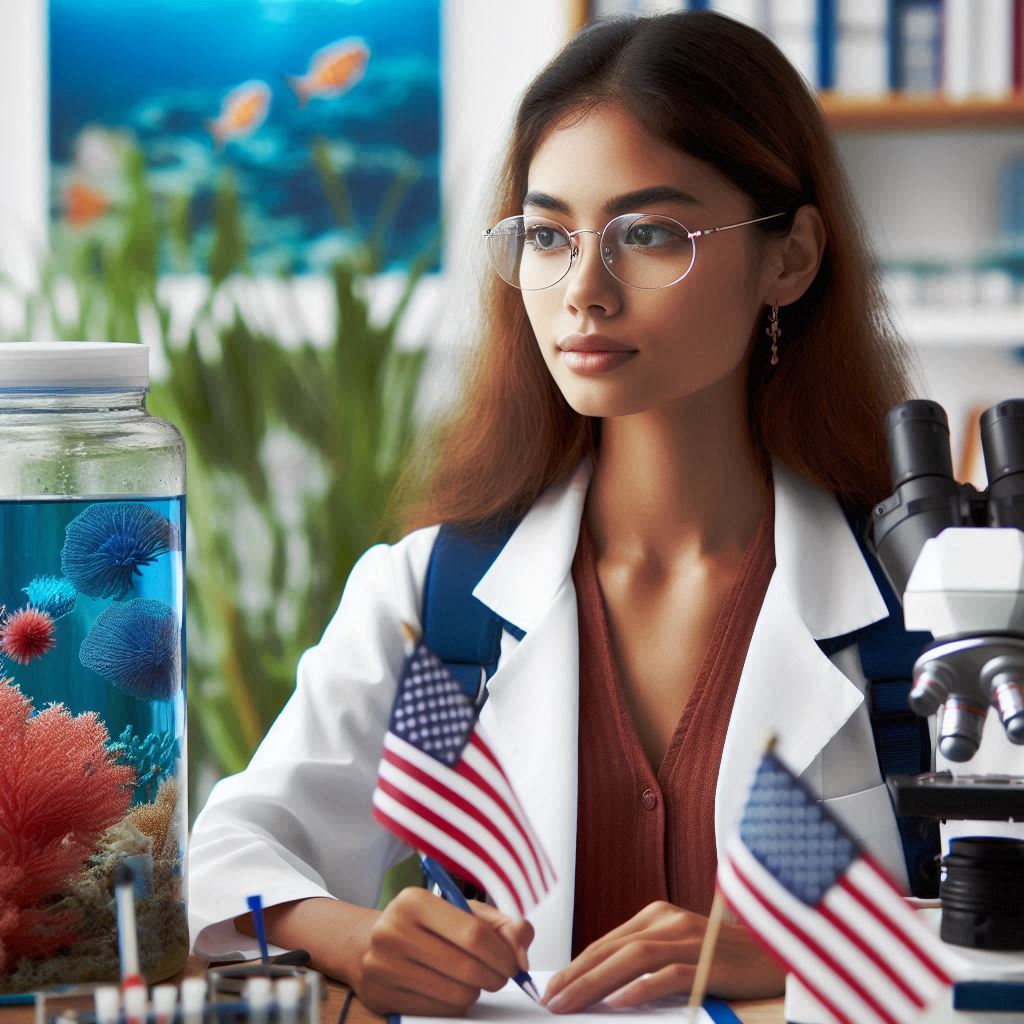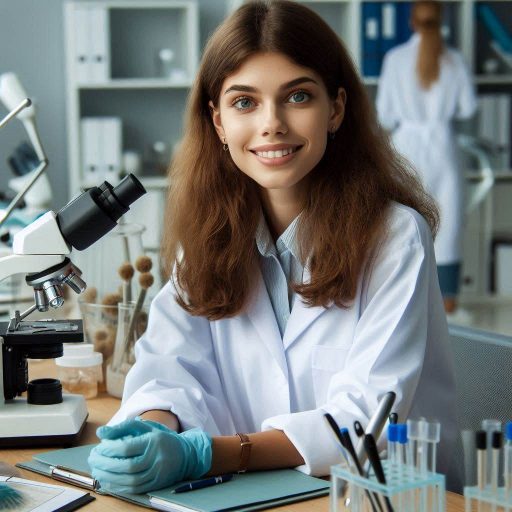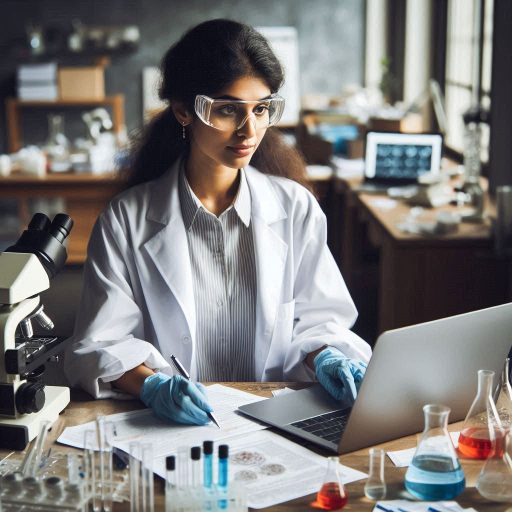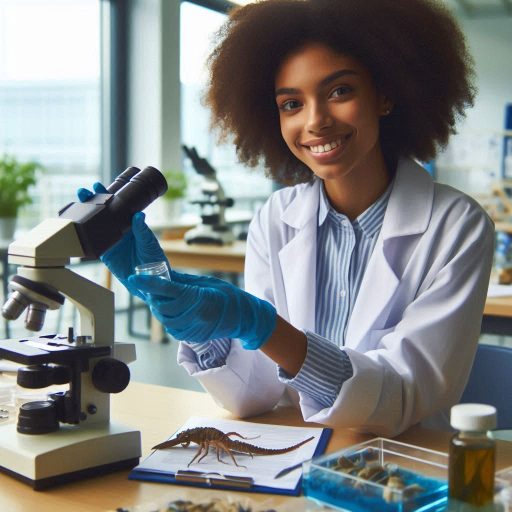Introduction
Marine biologists play a vital role in aquaculture, which is the farming of aquatic organisms such as fish, shellfish, and seaweed.
Their expertise helps ensure that these species are raised in sustainable and efficient environments.
As the global demand for seafood continues to grow due to population increases and changing dietary preferences, aquaculture has emerged as a key solution to meet this demand.
Marine biologists contribute to various areas within the aquaculture industry.
They engage in research to improve breeding practices, focusing on enhancing growth rates and disease resistance in aquatic species.
Additionally, they study the environmental impacts of aquaculture systems, ensuring that farming practices do not harm surrounding ecosystems.
Marine biologists also play a significant role in developing sustainable feeding strategies and monitoring water quality, which are critical for the health of farmed species.
Through their work, marine biologists not only support the efficiency of aquaculture practices but also contribute to the long-term sustainability of the industry.
Ultimately helping to secure a reliable seafood supply for future generations.
Conducting Research Marine Biologists Conduct Research to Improve Aquaculture Practices
Marine biologists play a vital role in aquaculture through extensive research.
They focus on improving practices that enhance productivity and sustainability.
By conducting various studies, they address challenges faced by the aquaculture industry and ensure its growth.
They Study Fish Behavior, Reproduction, and Nutrition to Optimize Farming Conditions
Understanding fish behavior is crucial for effective farming.
Marine biologists observe how fish interact within their environment.
This knowledge helps farmers create suitable habitats that reduce stress and promote healthy growth
For instance, researchers study social behaviors to develop stocking densities that minimize aggression.
Reproductive studies are essential for successful aquaculture.
Marine biologists investigate the spawning habits of different fish species.
They aim to determine the optimal conditions for reproduction.
This research leads to improved breeding programs, ensuring a steady supply of healthy stock.
Enhanced breeding practices also help maintain genetic diversity, essential for long-term sustainability.
Nutrition is another key area of research for marine biologists.
They analyze the dietary needs of various fish species at different life stages.
By formulating balanced diets, they promote healthy growth and reduce disease susceptibility.
Proper nutrition also leads to better feed conversion rates, benefiting both farmers and the environment.
Research Helps in Developing Sustainable Aquaculture Techniques
Marine biologists use advanced technologies to conduct their research.
Techniques like molecular biology and genomics allow for deeper insights into fish physiology.
These tools help identify specific genes related to growth, health, and reproduction.
Understanding these genetic factors can lead to selective breeding programs that enhance desirable traits.
Sustainable aquaculture techniques are a primary focus of marine biologists.
They conduct research to minimize the environmental impact of fish farming.
This includes studying the effects of waste products on water quality.
By developing better waste management strategies, they help maintain healthier ecosystems.
Marine biologists also explore alternative feed sources for aquaculture.
They study the potential of using plant-based diets or by-products from other industries.
This research aims to reduce reliance on fishmeal, which can deplete wild fish populations.
Sustainable feed options contribute to the overall health of marine ecosystems.
Collaboration is key in marine biology research.
Researchers often work with farmers to implement their findings.
This partnership ensures that scientific advancements are practical and beneficial for the industry.
It also fosters a culture of continuous improvement and adaptation in aquaculture practices.
Marine biologists significantly contribute to aquaculture through research.
Their studies on fish behavior, reproduction, and nutrition optimize farming conditions.
This research ultimately leads to sustainable aquaculture techniques, benefiting both the industry and marine ecosystems.
Their ongoing efforts are essential for the future of aquaculture, ensuring it meets global food demands responsibly.
Read: Challenges and Rewards: The Dual Life of an U.S. Environmental Scientist
Monitoring Water Quality
Marine Biologists Oversee Water Quality in Aquaculture Facilities
Marine biologists play a critical role in monitoring water quality in aquaculture facilities.
They ensure that the aquatic environment remains optimal for farming practices.
Their oversight is essential for maintaining healthy fish populations and sustainable operations.
They Test for Pollutants, Oxygen Levels, and pH to Ensure a Healthy Environment for Aquatic Organisms
To maintain water quality, marine biologists conduct regular tests for various parameters.
They monitor pollutants that could harm aquatic life.
This includes checking for harmful chemicals, heavy metals, and excess nutrients.
Additionally, they assess oxygen levels to ensure that fish can thrive in their environment.
pH levels are another crucial factor in maintaining water quality.
Marine biologists regularly measure pH to prevent conditions that can stress or harm aquatic organisms.
Proper pH levels promote healthy growth and reproduction.
By maintaining balanced water chemistry, they support the overall health of fish populations.
Monitoring Helps Prevent Disease Outbreaks and Improves Overall Production
Regular monitoring of water quality plays a significant role in preventing disease outbreaks.
By identifying potential problems early, marine biologists can implement corrective actions promptly.
This proactive approach helps minimize stress on fish and reduces the likelihood of infections.
Healthy water quality directly impacts overall production in aquaculture.
When conditions are optimal, fish grow faster and healthier, leading to better yields.
Marine biologists’ efforts in monitoring and maintaining water quality significantly enhance the efficiency of aquaculture operations.
Collaboration with aquaculture managers is essential for effective water quality management.
Marine biologists work closely with facility staff to develop monitoring protocols.
This teamwork ensures that all aspects of water quality are considered and addressed regularly.
Advanced technologies assist marine biologists in monitoring water quality.
They use sensors and automated systems to collect real-time data on various parameters.
This technology allows for quicker responses to any changes in water quality.
Marine biologists play a crucial role in monitoring water quality in aquaculture facilities.
Their regular testing for pollutants, oxygen levels, and pH ensures a healthy environment for aquatic organisms.
This vigilant monitoring helps prevent disease outbreaks and improves overall production.
Their contributions are vital for the success and sustainability of aquaculture practices.
Read: Job Market Trends: Future of Chemistry Jobs in America
Developing New Technologies
Marine Biologists Work on Developing New Technologies for Aquaculture
Marine biologists are at the forefront of developing new technologies to enhance aquaculture practices.
Their research and innovation drive improvements that benefit both the industry and the environment.
By leveraging their expertise, they aim to address the challenges faced by fish farmers today.
They Design Innovative Fish Farming Systems, Such as Recirculating Aquaculture Systems (RAS) and Offshore Cages
One area of focus is the design of innovative fish farming systems.
Recirculating aquaculture systems (RAS) are gaining popularity due to their efficiency.
These systems recycle water, reducing the need for large water bodies.
This design minimizes water usage while maintaining optimal conditions for fish growth.
Offshore cages represent another advancement in fish farming technology.
Marine biologists develop these cages to enable farming in deeper waters.
This approach reduces competition with coastal ecosystems and allows for larger production capacities.
Offshore cages can help alleviate some pressures on nearshore environments.
New Technologies Increase Efficiency, Minimize Environmental Impact, and Enhance Production Capacity
The new technologies developed by marine biologists significantly increase efficiency in aquaculture operations.
Automated feeding systems and monitoring tools optimize feeding schedules and reduce waste.
These advancements allow farmers to allocate resources more effectively, leading to higher productivity.
Additionally, innovative systems minimize environmental impact.
By reducing water pollution and resource consumption, these technologies promote sustainability in aquaculture.
Marine biologists aim to create practices that not only benefit fish farming but also protect marine ecosystems.
Enhancing production capacity is another goal of new technological developments.
Advanced breeding techniques and selective breeding programs help produce faster-growing and healthier fish.
These improvements enable farmers to meet the growing global demand for seafood.
Collaboration with engineers and technologists is essential for successful technology development.
Marine biologists work alongside these professionals to design systems that meet the needs of fish farmers.
This interdisciplinary approach ensures that new technologies are both practical and effective.
Marine biologists play a vital role in developing new technologies for aquaculture.
Their innovative designs, such as recirculating aquaculture systems and offshore cages, enhance efficiency and sustainability.
These advancements minimize environmental impact and increase production capacity.
By continuing to innovate, marine biologists help shape the future of aquaculture, ensuring its viability and success.
Read: Challenges and Rewards: Navigating the Chemist Career Path
Managing Disease Outbreaks
Marine Biologists Play a Crucial Role in Managing Disease Outbreaks in Aquaculture
Marine biologists are essential in managing disease outbreaks within aquaculture systems.
Their expertise allows them to develop strategies that protect farmed fish from harmful pathogens.
Effective disease management ensures the health and productivity of fish populations.
They Identify Pathogens, Implement Vaccination Programs, and Develop Treatment Strategies
A key responsibility of marine biologists is identifying pathogens that threaten fish health.
They conduct thorough investigations to detect viruses, bacteria, and parasites.
By understanding the pathogens, they can implement effective control measures and treatment protocols.
Vaccination programs are vital for preventing disease outbreaks.
Marine biologists design and administer vaccines to boost fish immunity.
These programs help reduce the incidence of disease, ensuring that fish remain healthy and productive.
Early vaccination can save farms from extensive losses caused by outbreaks.
In addition to vaccinations, marine biologists develop treatment strategies for infected fish.
They research effective medications and therapies to combat diseases.
By implementing these treatments promptly, they minimize the impact of outbreaks on fish health and overall production.
Disease Management Is Essential for Maintaining the Health of Farmed Fish and Preventing Economic Losses
Effective disease management is critical for maintaining the overall health of farmed fish.
Healthy fish grow faster and have higher survival rates, leading to increased production.
This directly contributes to the economic viability of aquaculture operations.
Preventing disease outbreaks also protects farmers from significant economic losses.
Outbreaks can lead to high mortality rates and, consequently, financial strain.
By managing diseases effectively, marine biologists help farmers sustain their operations and maintain profitability.
Collaboration between marine biologists and aquaculture managers is crucial for effective disease management.
This teamwork ensures that monitoring systems are in place to detect potential outbreaks early.
With rapid response protocols, farmers can take action before diseases spread.
Advanced technologies support marine biologists in managing diseases.
Diagnostic tools and monitoring systems enable quick identification of pathogens.
This technology allows for immediate interventions, reducing the risk of widespread outbreaks.
Marine biologists play a vital role in managing disease outbreaks in aquaculture.
Their ability to identify pathogens, implement vaccination programs, and develop treatment strategies is essential.
Effective disease management helps maintain the health of farmed fish and prevents economic losses.
By continuing their research and collaboration, marine biologists ensure the sustainability and success of aquaculture practices.
Read: Organizations & Associations for Environmental Scientists in the USA

Educating Fish Farmers
Marine Biologists Provide Training and Education to Fish Farmers
Marine biologists play a crucial role in educating fish farmers about aquaculture practices.
Their training programs focus on enhancing the knowledge and skills of farmers.
By sharing their expertise, marine biologists help farmers adapt to changing industry standards.
They Share Knowledge on Best Practices, Environmental Regulations, and Sustainable Aquaculture Methods
One of the primary focuses of marine biologists is to share best practices with fish farmers.
They cover essential topics like feeding techniques, water quality management, and disease prevention.
These practices lead to healthier fish and more efficient farming operations.
Marine biologists also educate farmers about environmental regulations.
Understanding these regulations is critical for compliance and sustainability.
By informing farmers of local and global standards, they promote responsible aquaculture practices that protect ecosystems.
Sustainable aquaculture methods are another key area of focus.
Marine biologists introduce farmers to innovative practices that reduce environmental impact.
Techniques like integrated multi-trophic aquaculture (IMTA) help create balanced ecosystems that benefit both fish and the surrounding environment.
Education Helps Improve the Skills of Fish Farmers, Leading to Better Productivity and Profitability
The education provided by marine biologists directly enhances the skills of fish farmers.
As farmers learn about modern practices and technologies, they become more efficient.
Improved techniques lead to better fish growth rates and higher survival rates.
Additionally, educated farmers can adapt more quickly to industry changes.
They are better equipped to handle challenges such as disease outbreaks or market fluctuations.
This adaptability contributes to the overall stability and success of aquaculture operations.
Increased productivity also translates to higher profitability for fish farmers.
With the knowledge gained from marine biologists, farmers can optimize their operations.
Improved management practices reduce costs while maximizing output, benefiting their bottom line.
Collaboration between marine biologists and fish farmers fosters a continuous learning environment.
Workshops, seminars, and field training allow for practical applications of knowledge.
This hands-on experience enhances the understanding of best practices and sustainable methods.
Marine biologists play a vital role in educating fish farmers.
Their training on best practices, environmental regulations, and sustainable methods significantly impacts the industry.
Education enhances the skills of fish farmers, leading to better productivity and profitability.
By continuing to share knowledge, marine biologists contribute to the long-term sustainability of aquaculture.
Transform Your Career Today
Unlock a personalized career strategy that drives real results. Get tailored advice and a roadmap designed just for you.
Start NowYou Might Also Like: Technological Advances Impacting Zoology Research
Conservation Efforts
Marine Biologists Participate in Conservation Efforts Related to Aquaculture
Marine biologists play a vital role in conservation efforts focused on aquaculture.
Their expertise helps assess and mitigate the environmental impacts of fish farming.
By participating in these initiatives, they aim to ensure that aquaculture practices are sustainable and responsible.
They Study the Impact of Fish Farming on Wild Populations and Ecosystems
A primary focus of marine biologists is studying how fish farming affects wild populations.
They research the interactions between farmed and wild fish, identifying potential risks.
This research helps in understanding how fish farming practices can influence genetic diversity and population dynamics in wild species.
Additionally, marine biologists assess the broader impacts of aquaculture on ecosystems.
They investigate how fish farms can affect water quality, habitat structure, and local biodiversity.
Understanding these impacts is essential for developing practices that minimize ecological harm.
Conservation Initiatives Help Promote Responsible Aquaculture Practices and Protect Biodiversity
Marine biologists contribute to conservation initiatives that promote responsible aquaculture practices.
They collaborate with industry stakeholders to develop guidelines and best practices.
These initiatives aim to balance the needs of aquaculture with the health of marine ecosystems.
By implementing responsible practices, the aquaculture industry can reduce its environmental footprint.
Initiatives like using sustainable feed sources and improving waste management are essential for protecting biodiversity.
Marine biologists guide these efforts, ensuring that aquaculture can coexist with healthy ecosystems.
Conservation efforts also focus on protecting threatened and endangered species.
Marine biologists work to develop strategies that mitigate the risks posed by aquaculture to these vulnerable populations.
This includes creating protected areas and implementing breeding programs to bolster wild stocks.
Collaboration with government agencies and non-profit organizations enhances conservation initiatives.
Marine biologists often work alongside these entities to promote policy changes that benefit both aquaculture and conservation efforts.
This teamwork fosters a holistic approach to managing marine resources.
Marine biologists play a crucial role in conservation efforts related to aquaculture.
Their research on the impacts of fish farming informs practices that protect wild populations and ecosystems.
Through conservation initiatives, they promote responsible aquaculture practices and safeguard biodiversity.
By continuing to advocate for sustainable methods, marine biologists help ensure the future health of marine environments.
Collaborating with Industry Partners
Marine Biologists Collaborate with Industry Partners in the Aquaculture Sector
Marine biologists play a crucial role in collaborating with industry partners within the aquaculture sector.
Their expertise is invaluable in addressing the various challenges faced by fish farming operations.
Through these partnerships, they aim to promote sustainable practices and enhance aquaculture’s overall effectiveness.
They Work with Fish Farmers, Government Agencies, and Research Institutions to Address Challenges and Promote Innovation
Collaboration begins with fish farmers, who benefit from marine biologists’ research and insights.
By working closely with farmers, biologists can identify specific issues impacting productivity and sustainability.
This collaboration leads to the development of tailored solutions that enhance farm operations.
Marine biologists also partner with government agencies to shape policies that support sustainable aquaculture.
Their scientific knowledge helps inform regulations and guidelines, ensuring they are practical and beneficial.
By collaborating with policymakers, marine biologists can advocate for practices that protect both the industry and the environment.
Research institutions are another key partner in this collaborative effort.
Marine biologists work alongside researchers to conduct studies that address industry challenges.
This joint research leads to innovative solutions and advances in technology, benefiting aquaculture practices.
Collaboration Fosters a Cohesive Approach to Sustainable Aquaculture Development
The collaborative efforts of marine biologists and industry partners foster a cohesive approach to sustainable aquaculture development.
By pooling resources and expertise, these partnerships can tackle complex issues more effectively.
This unified approach enhances the resilience and adaptability of aquaculture systems.
Through collaboration, stakeholders can share knowledge and best practices, leading to continuous improvement in the industry.
Workshops and seminars often result from these partnerships, facilitating information exchange among farmers, researchers, and policymakers.
Such interactions strengthen the overall aquaculture community.
Moreover, collaboration promotes innovation in aquaculture practices.
Marine biologists and their partners can explore new technologies and methodologies to improve efficiency and sustainability.
These innovations often stem from interdisciplinary efforts that bring together diverse perspectives and expertise.
In fact, marine biologists are integral to collaborating with industry partners in aquaculture.
Their partnerships with fish farmers, government agencies, and research institutions address challenges and promote innovation.
This collaboration fosters a cohesive approach to sustainable aquaculture development, ensuring the industry’s long-term viability.
By working together, stakeholders can enhance productivity while protecting marine ecosystems.
See Related Content: Nanotechnology: Research Labs and Facilities
Delve into the Subject: Top Universities for Nanotechnology Programs
You Might Also Like: Virologist’s Guide to Publishing Research Papers
Conclusion
Marine biologists play a crucial role in aquaculture.
They engage in extensive research on aquatic organisms, helping to improve breeding techniques and health management.
Their expertise is essential for developing sustainable farming practices that minimize environmental impacts.
By studying ecosystems, marine biologists can assess the ecological balance in aquaculture settings and help mitigate potential risks associated with farming.
Additionally, marine biologists contribute significantly to disease prevention and treatment, ensuring healthy stock production and reducing reliance on chemicals.
Their research informs better feeding strategies and enhances the nutritional quality of farmed species.
They also evaluate the impacts of climate change on aquatic life, guiding adaptation strategies in aquaculture systems.
The contributions of marine biologists are vital for the industry’s growth and sustainability.
Their work supports food security and economic stability in coastal communities, which rely heavily on aquaculture for livelihood.
The continued research and collaboration among scientists, farmers, and policymakers are essential for advancing aquaculture practices.
Innovative solutions from marine biology will help meet the global demand for seafood while promoting responsible practices.
Fostering partnerships enhances knowledge sharing and technology transfer, making it easier to adopt best practices.
With ongoing efforts, we can ensure a sustainable future for aquaculture and the health of our oceans.
By prioritizing research and collaboration, we can protect marine ecosystems and support the livelihoods of those who depend on aquaculture for their way of life.
[E-Books for Sale]
The Big Book of 500 High-Paying Jobs in America: Unlock Your Earning Potential
$19.99 • 500 High-Paying Jobs • 330 pages
Explore 500 high-paying jobs in America and learn how to boost your career, earn more, and achieve success!
See All 500 High-Paying Jobs of this E-Book
1001 Professions Without a Degree: High-Paying American Jobs You Can Start Now
$19.99 • 1001 Professions Without a Degree • 174 pages
Discover 1001 high-paying jobs without a degree! Unlock career tips, skills, and success strategies for just $19.99!




